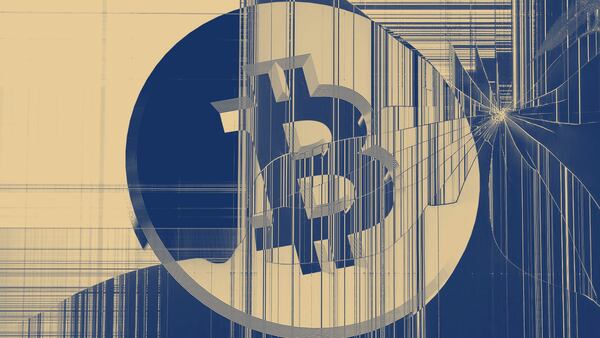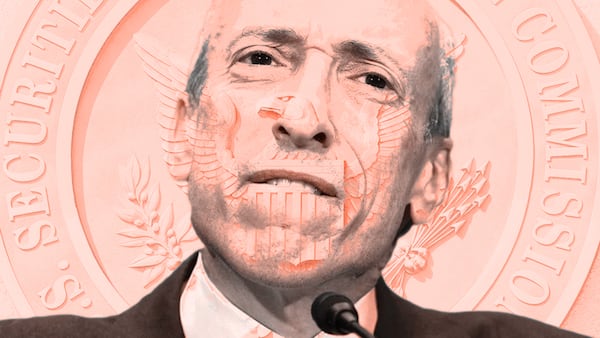- Global banks and asset managers are bullish about crypto. But these strictly-regulated firms remain cautious of an asset class that represents huge risks.
- Speakers at a digital assets conference held in London this week said finance still sees potential in crypto.
- Blockchain tech remains one major area of investment for the likes of Goldman Sachs and JPMorgan
Wall Street and the City have cautiously dipped their toes into digital assets and blockchain technology. But successive scandals, extreme volatility, plummeting investments and regulatory uncertainty have blunted any desire to throw themselves right in feet first.
But speakers at the Financial Times’ Crypto and Digital Assets Summit conference in London this week say finance juggernauts have not given up on crypto and digital assets. These speakers said institutional adoption of digital assets is inevitable — though it has to clear many significant hurdles first.
“Managers want to get into this space because of the returns,” said Michael Hall, chief investment officer and founder of Nickel Digital Asset Management. “It’s another asset class and why wouldn’t they want to be involved? The issue is, it’s quite difficult to do.”
Nickel, a crypto-native investment manager, has a variety of funds including fully hedged positions in crypto, a so-called “market neutral” strategy, and an alpha fund. Hall said Nickel’s own returns in its alpha fund were up 8% this year — “not bad when you look around the market.”
NOW READ: Jump and Jane Street retreat from crypto to hit smaller firms the hardest
In the crypto winter, a ray of sunshine for those concerned about its future is the institutionalisation of the asset class. For these investors, cryptocurrencies represent new sources of liquidity at a time when other asset classes are drying up.
They added that big asset managers and banks’ involvement could drive serious inflows into crypto assets and eventually make markets more liquid and accessible for retail investors.
But investor involvement is still largely among a limited subset of what is known in finance jargon as the “buy side” — high net worth investors, family offices and hedge funds — especially as Bitcoin rose this year. At Goliath asset managers like BlackRock or Fidelity, which own significant portions of the world’s wealth, crypto has made fewer inroads.
And this week brought more bad news as speed trading firms Jane Street and Jump Crypto retreated from trading crypto in the US, citing regulatory headwinds.
Vincent Gusdorf, senior vice president in the DeFi and digital assets team at Moody’s investor services, said he was “quite surprised by the limited understanding of crypto and blockchain” among financial behemoths, though he did not name any specific firms.
NOW READ: Citadel Securities among firms hustling to create a crypto market structure amid FTX ‘dumpster fire’
For these big firms, which manage other people’s money, crypto poses more risk than reward. The barriers to their adoption are largely regulatory, speakers said.
One major emerging risk, panellists agreed, is a patchwork of regulatory approaches developing across the globe. While some jurisdictions like the European Union put in place comprehensive frameworks to regulate crypto, others allow platforms in their territories to operate unsupervised.
‘If we have this black hole of unregulated institutions somewhere, that’s something that makes us uncomfortable.’
— Vincent Gusdorf
This kind of regulatory arbitrage could cause global instability and frighten financial institutions away from crypto, Gusdorf said.
“If we have this black hole of unregulated institutions somewhere, that’s something that makes us uncomfortable,” he said. “Which is why we are hoping that there will be more regulatory clarity and regulatory coordination.”
Blockchain not crypto
Speakers agreed, however, that while big asset managers are shying away from crypto as an asset class, they are all-in on the underlying technology.
This philosophy has the backing of investment banks, national securities exchanges and firms that provide the plumbing of the financial industry, as they see in it the potential to upgrade creaky legacy tech in banks.
For about a decade, banks and blockchain vendors like Digital Asset and R3 have embarked on countless projects testing the possibilities of blockchain for trading and settling tokenised securities like stocks and bonds. While many of these initial efforts have failed, even crypto sceptics like BlackRock CEO Larry Fink have grown bullish on tokenisation.
NOW READ: Paxos peddles gold bullion token to banks in wake of stablecoin slapdown
The latest such project, dubbed the Canton Network, was announced this week. Goldman Sachs, Microsoft, Deloitte and DRW’s crypto trading desk Cumberland were among the big names to sign on to Canton, which aims to provide a blockchain for connecting disparate systems across banks.
Matteo Dante Peruccio, president at consultancy Wave Digital Assets, note that the conference that heavyweights like JPMorgan Chase, Morgan Stanley and Goldman have invested heavily in blockchain technology.
“It’s way past the conversation about whether they will or won’t. It’s about what form that takes, where they put their capex and for what uses,” Peruccio said.
“The top players in this industry in 20 years will probably be some of the biggest banks.”





